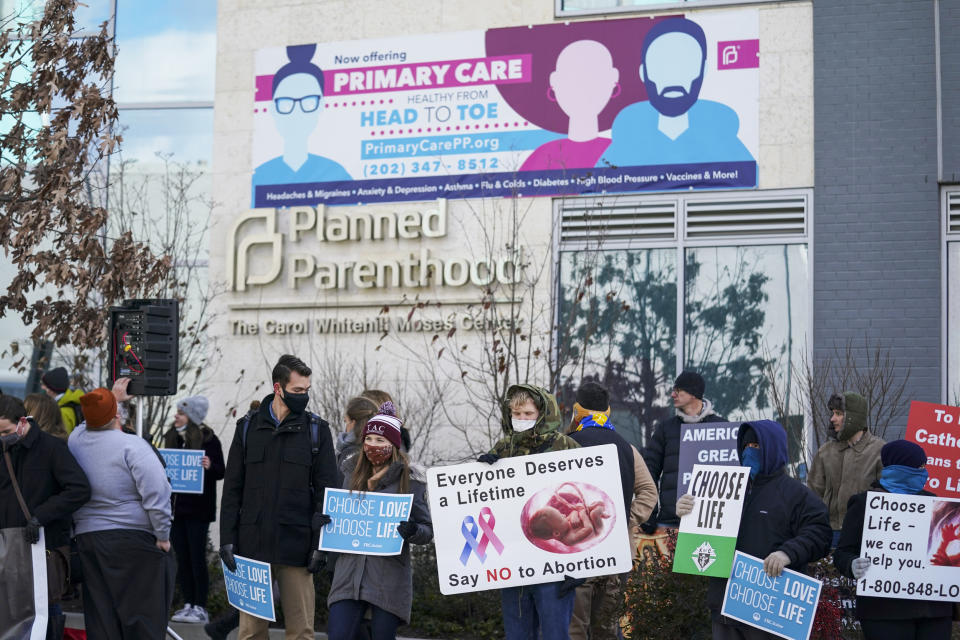Abortion providers face significant increase in violence, report finds
Abortion providers in the U.S. and two other countries faced significant increases in violence and disruptions to their work last year compared to the previous year, including stalking, invasions and assault and battery, according to a report released Friday by the National Abortion Federation, an abortion access organization.
Experts said the data reflects an increased polarization and caution that anti-abortion extremists could perpetrate more violence and disruption after the Supreme Court overturned Roe v. Wade on Friday, with about half the states indicating they would move to ban the procedure.
“I’m not surprised that there has been this uptick in violence, and I expect more,” said Carole Joffe, professor of obstetrics and gynecology at the University of California, San Francisco, and co-author of “Obstacle Course: The Everyday Struggle to Get an Abortion in America.”
“I think a certain portion of the anti-abortion movement — certainly not all, there is an extremist wing — I think they will do everything they can to make it very difficult for clinics in the blue states to provide [abortions],” said Joffe, who was not involved in the report.
The report, which compiled data from 580 clinics in the U.S. and 36 clinics in Canada and Colombia, said providers reported 123 incidents of both vandalism and assault and battery last year, up from 80 reported incidents of vandalism and 54 reported incidents of assault and battery in 2020.
The vandalism included “multiple incidents of bullets being fired through clinic windows, damage to HVAC equipment, cutting of power sources, bricks and rocks thrown through or at windows, and signs damaged,” according to the report.
Most assault and battery incidents involved altercations between anti-abortion protesters and clinic escorts and staff, as well as patients and their companions. Reports included pushing, shoving, slapping, kicking, use of pepper spray and physical fights outside clinics, the report stated.

Receipt of hoax devices and suspicious packages was the third most-reported occurrence of disruption, with 71 cases reported last year compared to 27 in 2020.
“Because of the history of attacks involving packages that contained dangerous materials, clinics have to treat these situations with maximum precaution and they can be very time-consuming to manage and disruptive to services,” the report stated.
Stalking increased 600% over the one-year period, with 28 providers saying they experienced it last year compared to four in 2020. More than half of the incidents last year were reported by abortion providers in Colombia, where “clinic staff reported being followed en route to and from clinics.” A dozen of the stalking cases were reported in the U.S., representing a 200% increase from the four reported in 2020.
Invasions almost doubled among providers, from seven in 2020 to 16 reported last year.
“In some cases, the perpetrators make fake appointments to gain access to the clinic while posing as patients and they cause disruptions and refuse to leave until law enforcement is called,” the report stated. “In others, they force their way into the clinic unannounced and refuse to leave.”
In one incident in April, four abortion protesters entered a Long Island, New York, clinic and remained inside for 1 1/2 hours before they were arrested on suspicion of obstructing government administration, the report said.
The Freedom of Access to Clinic Entrances Act, which prohibits blocking entrances to abortion clinics and intimidating workers and patients, “has been particularly effective in reducing the incidence of clinic blockades” since its 1994 enactment, the report stated. But providers still reported 11 blockades last year, compared to two the previous year, it said.
Nine providers reported receiving bomb threats last year, up from five the previous year. And 13 reported burglaries, up from eight in 2020.
One burglary report from a provider in Texas shortly after the state passed its abortion ban last September “mentioned that file cabinet drawers were gone through as if the perpetrator was looking for patient charts but was unsuccessful, and ultimately very little of value was taken,” according to the report.
It noted that while some disruptions decreased — two clinics were targeted for arson last year, compared to five in 2020 — “overall, harassment and violence have steadily increased in the last 45 years and remain a part of daily life for many abortion providers.”
“Since 1977, there have been 11 murders, 42 bombings, 196 arsons, 491 assaults, and thousands of incidents of criminal activities directed at patients, providers, and volunteers,” NAF said in a news release.
Last year’s rise in violence and disruption against abortion providers came in the second year of the pandemic, when providers were faced with staff shortages, temporary clinic closures and limits to the presence of volunteer escorts, “who often witness and report trespassing and other incidents outside of some clinics,” the report said.
Because of these factors, rates of violence and disruption were likely even higher than the reporting suggests, particularly in the areas of picketing, hate mail and phone calls, internet harassment, obstruction and trespassing, the report said.
